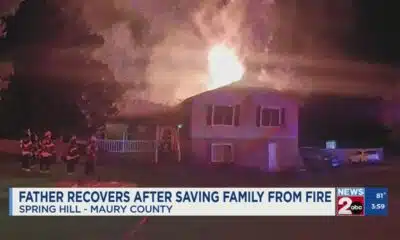News from the South - Louisiana News Feed
‘Solar for Y’all’ faces hazy future in Louisiana
‘Solar for Y’all’ faces hazy future in Louisiana
by Elise Plunk and Halle Parker, WWNO, Louisiana Illuminator
March 18, 2025
The future of millions of dollars in funding to help low-income Louisiana residents access solar energy has grown increasingly uncertain as the Trump administration attempts to slash grant programs awarded under its predecessor.
Last year, the state was given $156 million of Inflation Reduction Act funding to launch Louisiana’s Solar for All program, dubbed Solar for Y’all by the Louisiana Department of Energy and Natural Resources (LDENR). The money is expected to boost development of rooftop or community solar for residences and apartment buildings. It will also help fund more solar-powered resilience hubs to provide safe havens after hurricanes.
The program is “designed not only to put solar on people’s rooftops who couldn’t otherwise afford it, but also to invest in communities and invest in homes,” said Logan Burke, executive director for the Alliance for Affordable Energy, a utility watchdog group. “There’s a desperate need for that investment in Louisiana.”
Solar for All is one of three grant programs created to comply with Congress’s creation of the $27 billion Greenhouse Gas Reduction Fund. The IRA directed the Environmental Protection Agency (EPA) to spend $7 billion on grants to help low-income and disadvantaged communities install or benefit from technology that produces zero climate-warming emissions, specifically mentioning rooftop solar.
Of the three grant programs, only Solar for All has survived so far. On March 11, EPA Administrator Lee Zeldin announced he had canceled the other two programs, terminating $20 billion worth of contracts. Zeldin claimed his office had documented “incidents of misconduct, conflicts of interest and potential fraud” that hurt the programs’ integrity. However, a collective of former EPA employees say there hasn’t been substantial evidence of the claim.
“Any instability in an expected funding mechanism throws businesses,” said Burke, adding that such projects have wide-ranging economic benefits.
So far, the LDENR is still crafting its plan for the state program. That plan will then go before the EPA for approval before being implemented.
GET THE MORNING HEADLINES.
Sweeping cuts
Since Trump took office Jan. 20, the EPA has canceled more than 400 contracts the Biden administration awarded under the 2022 Inflation Reduction Act.
LDENR spokesman Patrick Courreges said the state agency’s preparation to launch the program hasn’t been disrupted. Despite the noise, he said they were proceeding as normal.
“We’re not blind or deaf. We know what’s out there, but at the moment all we’ve got to work with is the current status,” Courreges said, noting the LDENR staff has been in regular communication with the EPA to ensure they follow any requirements and comply with federal guidance.
But, as uncertainty looms, the solar industry and renewable energy advocates worry the program will be stopped before the historic federal investment makes any real impact.
Monika Gerhart, executive director for the Gulf States Renewable Energy Industries Association, said the $156 million was seed money for solar companies to ramp up investments in the state.
“Once you have that federal investment, then it results in more projects, direct and indirect economic benefits that don’t rely on federal funding,” she said.
Wide-ranging economic impacts
Gerhart said the economic impact of the federal money can multiply by “around three to five times” the amount invested in solar projects at this scale. This means the total value of the economic impact of $156 million in startup money could range anywhere from $468 million to $780 million in Louisiana.
She said that this money would spur indirect benefits such as “accelerated market development, innovation, technology advancements and investment in new Louisiana manufacturing” as well as the direct benefits of job creation and increased access to affordable energy.
Jesse George, a policy director for the Alliance for Affordable Energy, said development of community solar projects would help lower energy bills in a state where its poorest have some of the highest energy burdens in the country.
For example, in New Orleans, some households spend nearly a third of their income on energy bills. In 2023, almost one in five Entergy New Orleans customers “were disconnected for inability to pay their record high bills,” George said.
Community solar projects involve large solar arrays that sell the energy to utilities and share the savings with residents who subscribe to the project, typically paying a small monthly fee. The residents receive credit toward their energy bill without having to install solar at their own homes.
George said if the program is canceled, it would be “a huge blow to expanding access to these money-saving technologies for people.”
The program also helps low-income homeowners update their houses to ensure they’re strong enough to handle the addition of solar panels, Burke said. Upgrading a home’s roof would help with more than just solar.
“So much of what we’ve seen over the last number of years — especially following the years of [hurricanes] Laura, Delta, Zeta, Ida — is how many rooftops are still blue [covered with tarps], how many folks still haven’t had the cash flow to invest in structural; not just upgrades, but just addressing major issues like this,” Burke said.
The upgrades for solar panels could help fortify the roof against storms and bring down insurance costs, she said.
Presidential precedents
Whether Trump’s EPA can cancel the program is an open legal question.
Legal experts have said the administration is not only testing the limits of the executive branch’s power but trying to expand it.
The U.S. Constitution gives Congress the power of the purse, making it the sole branch that can appropriate and approve spending. Then, it’s the executive branch’s, or the president’s, job to carry out that spending.
Refusing to spend money on what it’s been allocated for goes against the separation of powers — a bedrock principle of democracy, many legal scholars say.
Abby Husselbee, a staff attorney at Harvard University’s Environmental and Energy Law Program, said this isn’t the first time a president has tried to avoid carrying out congressional appropriations.
In the 1970s, former President Richard Nixon tried the same tactic: holding funds to effectively veto the approved programs. In response, Congress passed the Impoundment Control Act to reinforce the Constitution’s separation of powers and make the president’s limitations clear.
While presidents are allowed to delay spending, they’re required to report to Congress for temporary pauses or permanent cancellations. Temporary delays can’t extend beyond the current fiscal year. To cancel funding, the president has to propose the action to Congress. If Congress doesn’t approve, the money must be released.
As the end of Trump’s first term neared, conservative legal scholars began propping up a theory that these limits on the president’s discretion on spending were unconstitutional. On the campaign trail, the president shared his plans to hold funds to cut “wasteful spending.” Unlike Nixon, the Trump administration is trying to claw back money that has already been awarded.
“It’s raising really important questions about the way we have traditionally understood those roles,” Husselbee said.
She noted that specific government contracts can’t be terminated unless the agency finds reasoning within the terms. Otherwise, it could be grounds for legal challenges.
“If we were to see awards get terminated, that isn’t the full end of the story with money,” Husselbee said.
The EPA is already rife with litigation. The agency’s sweeping termination of the National Clean Investment Fund and Clean Communities Investment Accelerator — the two other Greenhouse Gas Reduction Fund programs — came amid an onslaught of lawsuits questioning the legality of previous grant contract terminations. One lawsuit alleges that the EPA’s actions “effectively nullify a congressionally mandated and funded program.”
Congress asked to make cuts
Congress has had mixed reactions to the attempts by the Trump administration, split along party lines. House Democrats launched an investigation into the EPA’s stalled climate funding last week, while Republicans led the passage of a budget resolution that advocates worry could largely scrap the IRA’s climate and clean energy investments.
U.S. Rep. Troy Carter, D-New Orleans, sits on the House Energy and Commerce committee tasked with cutting $880 billion from the budget to pay for steeper tax cuts for the wealthiest Americans. He said as more judges declare Trump’s actions illegal, Republicans have pivoted to the budget, and other programs could be caught in the crossfire.
In addition to clean energy, “the only way to get to $880 billion would be to cut Medicaid and Medicare,” Carter said.
Cutting programs such as Medicaid and Solar for All would have ripple effects that extend across party lines, the congressman added.
“It’s not only impacting Democrats. It’s impacting Republicans. It’s impacting people throughout our country,” Carter said. “When the storms come and power outages are in effect, no one asked what party, what race, what’s your socioeconomic background.”
Despite threats to renewable energy projects under a new Trump administration, the solar industry is expected to grow in 2025, accounting for up to 81% of new power added to electric grids across the nation, according to a new report from the Energy Information Administration.
“Energy demand has continued to grow, and we have demonstrated that we need all of the energy that’s available,” Gerhart said.
“Solar creates a pretty good way to reach rising energy demands very quickly … at a reasonable cost.”
YOU MAKE OUR WORK POSSIBLE.
This report is a product of the Mississippi River Basin Ag & Water Desk, an independent reporting network based at the University of Missouri in partnership with Report for America, with major funding from the Walton Family Foundation.
Louisiana Illuminator is part of States Newsroom, a nonprofit news network supported by grants and a coalition of donors as a 501c(3) public charity. Louisiana Illuminator maintains editorial independence. Contact Editor Greg LaRose for questions: info@lailluminator.com.
The post ‘Solar for Y’all’ faces hazy future in Louisiana appeared first on lailluminator.com
News from the South - Louisiana News Feed
Wagers on touchdowns, strikeouts and even penalties: States eye limits on prop bets
by Kevin Hardy, Louisiana Illuminator
September 9, 2025
As a bankruptcy attorney, New Jersey Assemblymember Dan Hutchison said he sees clients “all the time” whose betting on football and baseball quickly leads to missed car payments, delinquent mortgages and, ultimately, bankruptcy.
The rise of live, in-game bets — in which a gambler could place more than 200 individual bets during a baseball game if they wager on each pitch thrown — has only amplified his misgivings.
“And I’m like, are you kidding me? I mean, they’re betting on the next pitch, the next play, and it’s constant,” he said. “There’s no pause. It’s just not healthy.”
Worried that those bets can worsen problem gambling and threaten the integrity of sports, Hutchison, a Democrat, introduced legislation to ban New Jersey gambling licensees from offering live bets on individual plays during sporting events.
That bill illustrates growing state interest in regulating proposition bets, commonly called prop bets, a form of sports betting that is popular with fans but worrisome for sports leagues and state officials nationwide.
Unlike wagering on which team will win or the point spread of a game, prop bets can center on the performance of an individual player or even a single play that doesn’t necessarily affect the outcome of a contest. Prop bets can include trivia, such as the color of the Gatorade dumped over the Super Bowl’s winning coach, or specific stats, like how many touchdowns a certain quarterback will score during a game or which team will score first.
Critics say prop bets are easier for athletes to manipulate than the outcome of an entire game. They also make individual players more susceptible to online harassment from gamblers and increase the frequency of betting, thus raising the risk of addiction.
Ohio’s Republican governor has called for the nation’s first outright ban on prop betting on professional sports. Already, at least 15 states ban prop betting in collegiate sports, according to data maintained by the American Gaming Association, a trade group.
The heightened focus on prop bets comes amid a rapid rise of legal sports gambling, which is operational in 38 states and the District of Columbia. (Missouri plans to launch its new voter-approved program this December.) While legal betting has boosted state revenues and reshaped sports fandom, Hutchison said bankruptcy attorneys across the country are getting a preview of the financial wreckage it can wreak.
He said some clients are so distraught, he worries about potential suicides related to out-of-control gambling debts.
“That’s the reality of what’s going on. But they don’t make it seem like that when they’re doing these commercials during the football games: It’s normal, everybody does it, if you don’t do it, you’re not enjoying yourself,” he said. “That’s the glamour side of it. I deal with the other side.”
The industry’s rapid rise
The liberalization of sports gambling was made possible by a 2018 Supreme Court decision to strike down a federal law prohibiting gambling.
Since then, legal gambling has transformed the fan experience and propelled sportsbooks into major industry players: Americans are expected to wager an estimated $30 billion in legal sports betting on the NFL this season, according to the American Gaming Association. With so much money and energy flowing into gambling, academic researchers are increasingly raising concerns about the mental and financial consequences.
“The speed at which gambling has been marketed and legalized in this country is way faster than guardrails have been set to protect consumers and to try to give resources for problem gambling,” said Stephen Shapiro, a University of South Carolina professor who researches sports gambling.
Shapiro said a potential ban on prop betting in Ohio would prove a “big step” in gambling regulation. But he expects fierce opposition from the industry and consumers alike.
“They’re very popular. They’re arguably as — if not more — popular than betting on just individual games,” he said. “ … So I think there’ll be some backlash, but I also think over the next few years … there’s going to be an appetite for setting guardrails.”
The speed at which gambling has been marketed and legalized in this country is way faster than guardrails have been set.
– Stephen Shapiro, a University of South Carolina professor who researches sports gambling
The American Gaming Association, which represents casinos and sportsbooks, says that such restrictions would only drive gambling to illegal venues such as offshore betting platforms, where consumers have no protections.
But some sports leagues are ready for more restrictions on prop bets. The NCAA, the governing body for major college athletics, has been pushing federal and state leaders to ban prop betting in college sports.
The organization says 1 in 3 high-profile college athletes has received abusive messages from gamblers — the majority directed toward basketball players during tournament season. Just 12 days after North Carolina legalized sports betting last year — including prop bets on players — the University of North Carolina’s Armando Bacot reported receiving more than a hundred abusive social media messages for not accumulating enough rebounds in a game.
Women’s basketball student-athletes received about three times the number of threats as men’s basketball student-athletes, according to the NCAA.
In a March awareness campaign, NCAA President Charlie Baker said the abuse threatens the well-being of student-athletes and the overall environment of college sports.
“We need fans to do better,” he said in a statement at the time. “We need states to do better and ban player props that target student-athletes and enable detrimental abuse.”
And professional teams have their own concerns. Last month, ESPN reported the NBA and its players union supported further limits on certain prop bets. This summer, MLB Commissioner Rob Manfred told reporters he would like to see some limits on prop bets.
“There are certain types of bets that strike me as unnecessary and particularly vulnerable,” Manfred said, according to Yahoo Sports.
Ohio Gov. Mike DeWine wants to ban prop bets after gambling allegations against Guardians players
In late July, Ohio Republican Gov. Mike DeWine called on state regulators to outright ban all prop bets — a request he asked the professional sports leagues to support.
DeWine’s proposal followed the suspensions of Cleveland Guardians’ pitchers Luis Ortiz and Emmanuel Clase, who are being investigated by MLB. A sports betting integrity firm reportedly flagged two specific pitches Ortiz threw in early June that coincided with a pair of prop bets.
“The harm to athletes and the integrity of the game is clear, and the benefits are not worth the harm,” DeWine said in a July news release. “The prop betting experiment in this country has failed badly.”
The Ohio Casino Control Commission, which regulates sports betting, did not answer Stateline’s questions about the governor’s request. On Aug. 13, the agency said its investigation into the suspicious betting on the Guardians was ongoing.
In a statement responding to DeWine, the American Gaming Association said the Ohio incident is actually evidence that regulated gambling works: “It detects potential misconduct, it reports it, and it helps hold bad actors accountable,” said Joe Maloney, the association’s senior vice president of strategic communications.
In an interview, Maloney said eliminating legal prop betting will only move that activity into unregulated markets with no transparency. He said prop bets are a reflection of sports fandom: Bettors like to wager on their favorite players notching touchdowns or 3-pointers.
“It increases a fan’s engagement with the game they love, with the player they love. And so the idea that eliminating a legal betting market for someone really interested in increasing the level of engagement is going to prevent that activity, it’s just not the case,” Maloney said. “ … It simply will just move the activity into the shadows.”
Leagues endorse some limits
But the leagues are pushing for certain parts of the game to remain off-limits in legal betting markets.
Major League Soccer, for example, successfully pushed Illinois regulators last year to ban wagering on whether yellow and red penalty cards will be shown during a match and whether a specific player will receive a yellow or red card penalty.
Similarly, the state in February banned prop bets on NFL player injuries, player misconduct, officiating assignments, replay results and the first play of the game, following lobbying from the league.
Illinois Gaming Board spokesperson Beth Kaufman told Stateline the regulatory agency doesn’t maintain a list of specific prop bets that are allowed. But the board does require licensees to receive approval from the agency for specific wagers offered, she said.
“The IGB regularly monitors ongoing trends and developments in the industry and in major sports for any possible impact to the integrity of sports wagering in Illinois,” she said in a statement.
The NFL has pushed for similar rule changes in other states.
During a late August news briefing on gambling, David Highhill, the league’s vice president for sports betting, said the NFL has consistently objected to certain bets that raise integrity risks and provide limited fan engagement. Those include bets about officiating or player injuries and bets that are controllable by a single player on a single play.
“So things like ‘will this kicker miss a field goal’ are things that we’ve worked collaboratively across the board with operators to make sure those types of wagers are not offered,” he said.
In New Jersey, Hutchison said he doesn’t want to ban all sports betting or even all prop bets. And he knows his bill targeting so-called micro bets — those live, play-by-play bets — will face opposition, both from the industry and sports gamblers.
An avid sports fan himself, he said he doesn’t waste his money gambling on his beloved Philadelphia Eagles: “They don’t build all of those casinos in Atlantic City and Las Vegas because they pay out winners,” he said.
He said he’s not looking to end legal sports betting, but does think New Jersey needs to instill consumer protections and have a meaningful policy conversation about the societal costs of gambling.
New Jersey lawmakers are also considering a separate bill to ban player-specific prop bets on college sports.
The Council on Compulsive Gambling of New Jersey says it has experienced a nearly 300% increase in calls to its problem gambling hotline since the Garden State launched legal sports gambling in 2018.
In a July statement, Luis Del Orbe, executive director of the nonprofit council, which contracts with the state on gambling addiction issues, urged lawmakers to approve the bill to ban live, in-game bets. The organization says those high-frequency bets can trigger instant dopamine releases in the brain’s reward system, fostering compulsive behaviors that can lead to addiction.
“By limiting the proliferation of micro betting, this legislation takes an essential step toward protecting citizens from the harmful effects of reckless gambling practices,” Del Orbe’s statement said.
Stateline reporter Kevin Hardy can be reached at khardy@stateline.org.
This story was originally produced by Stateline, which is part of States Newsroom, a nonprofit news network which includes Louisiana Illuminator, and is supported by grants and a coalition of donors as a 501c(3) public charity.
Louisiana Illuminator is part of States Newsroom, a nonprofit news network supported by grants and a coalition of donors as a 501c(3) public charity. Louisiana Illuminator maintains editorial independence. Contact Editor Greg LaRose for questions: info@lailluminator.com.
The post Wagers on touchdowns, strikeouts and even penalties: States eye limits on prop bets appeared first on lailluminator.com
Note: The following A.I. based commentary is not part of the original article, reproduced above, but is offered in the hopes that it will promote greater media literacy and critical thinking, by making any potential bias more visible to the reader –Staff Editor.
Political Bias Rating: Center-Left
The content presents a balanced view on the issue of sports betting regulation, highlighting concerns about problem gambling and the social costs associated with certain types of bets, particularly prop bets. It features perspectives from Democratic lawmakers advocating for consumer protections and regulation, as well as industry representatives warning against overregulation. The article also references bipartisan actions, including Republican officials supporting bans on specific bets. Overall, the piece leans slightly left by emphasizing public health and regulatory measures but maintains a generally centrist tone by including multiple viewpoints and avoiding partisan rhetoric.
News from the South - Louisiana News Feed
Morning Forecast – Tuesday, Sept. 9th
SUMMARY: Tuesday morning starts cool with clear skies and temperatures in the upper 50s. A few clouds and isolated showers may appear in eastern parishes and parts of Mississippi but will remain outside the main area. The region will stay mostly sunny and dry through the weekend, worsening moderate drought conditions in Arkansas. Temperatures will rise steadily, reaching the upper 90s by the weekend due to a persistent upper-level ridge over the Southern Plains. High pressure will maintain dry air and stable conditions, limiting storms. Overall, expect sunny skies, dry air, and near-zero precipitation chances throughout the forecast period.
Skies remain clear this morning as temperatures have fallen to the upper 50’s, making for a nice and cool start for this Tuesday morning. A few clouds are possible for our eastern parishes in the MS River Valley as pop-up showers and storms will be possible across parts of Mississippi this afternoon but staying outside our coverage area. More clouds could linger into tomorrow but staying mostly sunny, nonetheless. The forecast looks to stay dry all the way through the weekend, which does not help in the current moderate drought conditions in Arkansas. Temperatures will also be on the climb pushing back to the upper 90’s by the weekend.
News from the South - Louisiana News Feed
Haynes’ defense blames DA Don Landry in bribery case
SUMMARY: Assistant District Attorney Gary Haynes faces multiple federal felony charges related to a bribery scheme involving Lafayette’s pretrial diversion program. His defense argues Haynes was a victim, duped by co-conspirators Leonard Franques and Dusty Guidry, who pleaded guilty and cooperated with prosecutors. Haynes allegedly lost $219,000 investing in Franques’ business, blaming District Attorney Don Landry for appointing him and hiring Guidry. Landry testified he brought Haynes back to manage the program due to a case backlog but denied involvement in wrongdoing. Prosecutors allege Haynes conspired for bribes and obstruction, facing up to 65 years if convicted. The trial continues with Landry’s cross-examination.
The post Haynes’ defense blames DA Don Landry in bribery case appeared first on thecurrentla.com
-
Mississippi Today7 days ago
Brandon residents want answers, guarantees about data center
-
News from the South - Texas News Feed5 days ago
Texas high school football scores for Thursday, Sept. 4
-
Our Mississippi Home7 days ago
Southern Miss Faculty and Student Contribute to Groundbreaking NOAA-Funded Plastic Cleanup
-
The Conversation7 days ago
AI is transforming weather forecasting − and that could be a game changer for farmers around the world
-
News from the South - West Virginia News Feed7 days ago
Missing man with dementia found dead
-
News from the South - Louisiana News Feed5 days ago
Portion of Gentilly Ridge Apartments residents return home, others remain displaced
-
News from the South - South Carolina News Feed7 days ago
Trump announces that Space Command is moving from Colorado to Alabama
-
News from the South - Alabama News Feed5 days ago
Alabama state employee insurance board to seek more funding, benefit changes











































